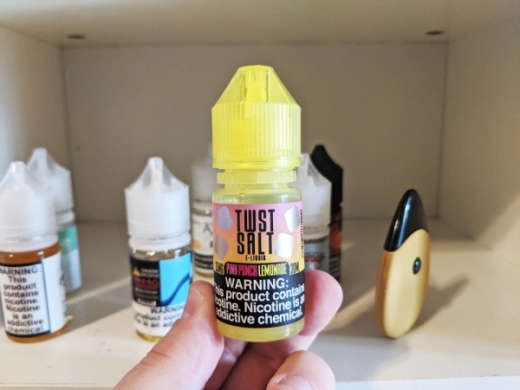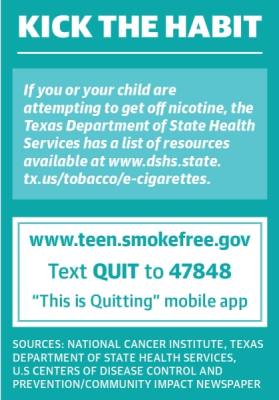The regulations come after a tumultuous 2019 for the vaping industry, a year that saw sales tumble after a string of nationwide lung injuries, many of which happened to minors, were attributed by the Centers for Disease Control and Prevention to vaping devices.
But the United States Vaping Association, a Cedar Park-based nonprofit trade association supporting small businesses in the vaping industry, has active lawsuits against the U.S. Food and Drug Administration, one of the federal agencies overseeing the new vaping regulations.
“They are creating a regulatory path that a small business cannot complete,” said Travis Pinkerton, president and executive director of the USVA.
NEW LOOMING LAWS
Patients hospitalized with lung injuries that would later be attributed to vaping began rising in number in late June 2019, according to CDC data, eventually peaking in the middle of September.As of January, a total of 2,602 hospitalized e-cigarette, or vaping, product use-associated lung injury cases have been reported across all 50 states and two U.S. territories, resulting in 57 deaths, according to the CDC.
“We went through September and October with a significant amount of chaos in the industry,” said Mike Hobble, who owns Drip-n-Rip Vape Shop with four locations in the Austin area. “Manufacturers—their sales decreased 70%-80%. Vape shops saw [sales decrease] anywhere from 20%-50%.”
Independently owned vape shops and e-liquid manufacturers feel they are being unfairly targeted by federal regulators in response to the rash of lung injuries, Pinkerton said, because the majority of patients with injuries reported using THC-containing products. Those products are illegal to sell in Texas.
According to CDC data, 82% of hospitalized patients reported using THC-containing products, and 34% reported exclusive use of THC-containing products. Further, 78% of patients reported acquiring products only from “informal sources” such as family, friends, dealers or online purchases.
On Sept. 11, President Donald Trump, joined by the acting commissioner of the FDA and the secretary of the U.S. Health and Human Services, announced the FDA would begin the process of banning all flavored e-cigarette and vape liquids from the market, excluding tobacco flavors.
“Most individuals not only prefer the flavored liquids but they like to try different things. ... The variety for them, I think, is really important for staying on the path of staying off cigarettes,” Hobble said.
On Jan. 2, the FDA released a new set of guidelines for e-cigarette and vaping juices. The guidelines banned flavored juices, excluding menthol and tobacco flavors, in closed-system e-cigarettes, such as the popular brand Juul. The ban excluded open-system vapes and vape liquids more commonly found in independently owned shops across Austin.
Local vape store owners and manufacturers of vape liquid are not out of the woods yet, Pinkerton stated. Although the FDA’s January ban only affects closed-system e-cigarettes that are more commonly sold in gas stations and convenience stores, the regulatory agency set a May 12 deadline for an application process the USVA asserts disproportionately hurts small businesses.
This May, vaping product manufacturers and retailers will have to submit Premarket Tobacco Product Applications, or a PMTA, on any product intended for a tobacco product. All products that were not on shelves as of Aug. 8, 2016, are required to submit a PMTA to the FDA.
Every vape shop would be subject to these reviews. Community Impact Newspaper counted 13 vape shops in the six ZIP code distribution area for its Northwest Austin edition.
Those reviews are so costly and time consuming, Pinkerton said, that they could easily sink small, locally owned vape businesses. Two USVA members reached out to labs in the U.S. that could provide testing on their products and found that just one review could cost up to $250,000, Pinkerton said. Labs in Israel could do the testing for a reduced price, but Pinkerton said they have a huge waiting list due to high demand.
“Even if you have that money, the industry is dead because you’re waiting 16 months [for a test,]” Pinkerton said.
The USVA sent out a survey to its members based in Texas and found the new federal application guidelines, if enacted in May, would result in a collective $15 million loss statewide in inventory.
“And that doesn’t include breaking leases or defaulting on retail space. That isn’t including the jobs [lost],” Pinkerton said.
PROTECTING MINORS
In Texas, 18.9% of high school students and 6% of middle school students used e-cigarettes in the past 30 days, according to a 2018 Texas Department of State Health Services report.Further, state data shows 32.5% of Texas high school students reported having ever used electronic nicotine devices. For students in the 12th grade, that percentage increased to 43.3%, according to the 2018 Texas Youth Tobacco Survey.
The initial use of traditional cigarettes in Texas’ high school population is similar to the initial use of e-cigarettes, data shows. According to that same state survey, 30.2% of high school students reported having ever smoked cigarettes.
“The marketing and how [vaping] is targeted toward the younger citizens is definitely taking effect,” said Dr. Danielle Beachler, a pediatric pulmonologist at Dell Children's Medical Center. “Nicotine we know is especially harmful to developing brains. ... When exposed to nicotine early on there’s been an association with additional substance abuse later on in life.”
In its January announcement banning flavored closed-system e-cigarettes, the FDA directly stated the move was to protect minors from beginning smoking habits.
“We will not stand idly by as this crisis among America’s youth grows and evolves,” HHS Secretary Alex Azar said in the Jan. 2 statement.
Pinkerton and Hobble both contend that vape shops already require identification from minors and have self-regulated better than gas stations that may carry Juuls and other closed-system e-cigarettes.
“While we do think that the FDA and the [Trump] administration have taken the step in the right direction to understand the [vaping] industry, there is much more that could be done to reduce the access that minors have to these,” Pinkerton said.
The Texas DSHS website provides materials to parents and children looking to get off nicotine, including resources from the HHS and the National Institutes of Health.
A few of the materials linked on the DSHS site are specifically targeted for parents looking to initiate a conversation with their children—intervention that Beachler states is needed earlier than parents may believe.
“Parents [should not] assume it is not their kid [and make] sure they talk to their kids openly and judgment free and starting younger than you might think—prior to middle school because that is how young we’re seeing it,” Beachler said.






